Over the years, I’ve seen countless startups launch with incredible ideas, only to stumble when it came to managing customer relationships. You’re juggling everything—product development, marketing, funding—and suddenly, you realize your inbox is a chaotic mess of leads and customer queries. Sound familiar?
This is where a solid CRM for startups becomes absolutely crucial. According to recent surveys, 60% of respondents say CRM is more important for achieving sales and marketing goals than it was five years ago.
It’s not just about storing contact details; it’s about building lasting relationships, automating tasks, and gaining insights that fuel growth.
In this blog, I’ll walk you through what a CRM for startups is and share 6 must-have CRM tools for 2025 that will help you scale your business efficiently. Let’s dive in!
What Is a CRM for Startups?
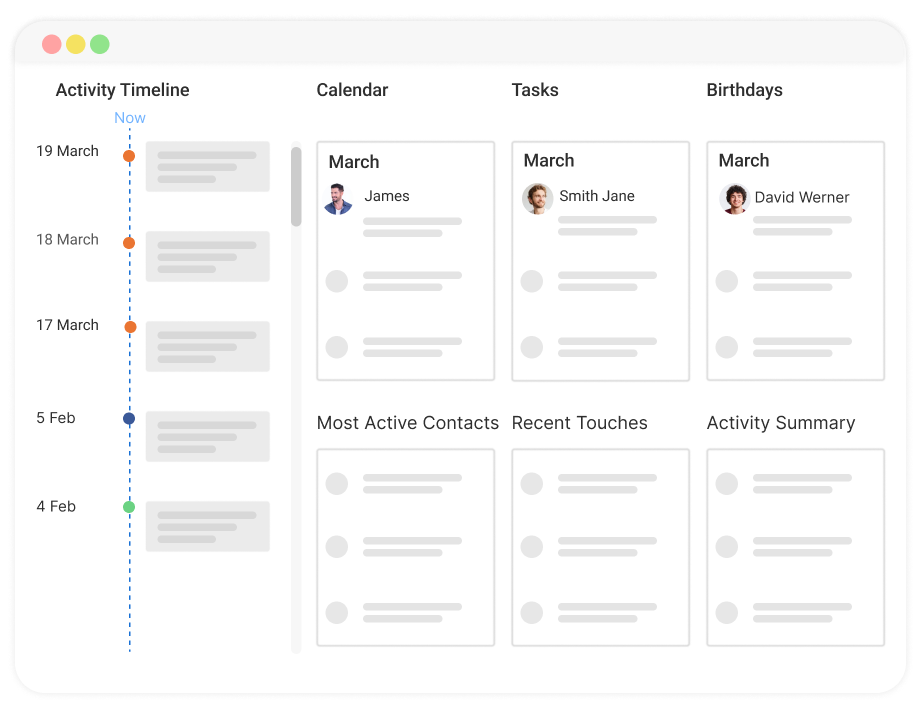
A CRM (Customer Relationship Management) system is a tool designed to help startups manage interactions with potential and current customers. Think of it as your startup’s digital assistant, keeping track of leads, contacts, sales, and customer service activities.
When you’re running a startup, staying on top of everything can be overwhelming. That’s where a Startup CRM comes in handy. It organizes all your customer data in one place, helping you to track your communication, sales pipelines, and follow-ups easily.
With a CRM, you can streamline your processes, improve your customer service, and even increase your sales. It helps you maintain strong relationships with your customers by providing insights into their needs and preferences. Plus, many CRM systems offer automation features, which can save you time by handling repetitive tasks.
What Are the Benefits of CRM for Startups?
If you’re running a startup, you already know how hectic it can get. That’s where a CRM system steps in to help. Let’s explore the benefits of having a CRM for your startup:
1. Improved Customer Relationship
Imagine having all your customer interactions in one spot. Emails, calls, social media messages – everything. A CRM lets you build detailed customer profiles. You can see their history, preferences, and even predict their needs. This means you’re not just guessing anymore, you’re making informed decisions.
2. Streamlined Sales Process
Are you chasing leads and feeling lost? The best startup CRM helps you visualize your sales pipeline. You can track where each lead is in the process, from initial contact to closing the deal. No more missed opportunities! Plus, automation features can take care of repetitive tasks, like sending follow-up emails. This frees up your time to focus on what matters most – building relationships.
Looking to Build a Custom Sales Pipeline?
3. Enhanced Team Collaboration
Everyone stays on the same page. A CRM facilitates seamless communication and collaboration between your sales, marketing, and customer service teams. This ensures that everyone has access to the same information, preventing miscommunication and duplication of effort.
4. Improved Customer Service
Happy customers are repeat customers. A CRM helps you provide faster, more personalized support. When a customer reaches out, you have all their information at your fingertips. Imagine resolving problems quickly and efficiently. That’s the power of a good CRM.
5. Data-Driven Decisions
Startups thrive on data. A CRM provides valuable insights into your sales, marketing, and customer service performance. You can see what’s working and what’s not. For example, you can see which marketing campaigns are generating the most leads or which products are most popular. This data helps you make smarter decisions.
6. Scalability
As your startup grows, your customer base will too. A CRM can scale with you, ensuring you don’t outgrow your systems. Investing in a CRM early on can save you a lot of headaches down the road. You can look into what is the Best Startup CRM for your companies specific needs, and future goals.
Here’s a quick breakdown of the top CRM options for startups in 2025, each designed to help you streamline your processes and drive growth efficiently.
Which Is the Best CRM for Startups?
If you are short on time, here’s a quick look at my top three picks from the list –
- BIGContacts: Best for small businesses and startups looking for a simple CRM tool that maximizes the effectiveness of their contact management, email marketing efforts, and outbound sales.
- Keap: Best for startups aiming to automate marketing and sales processes for better lead nurturing and conversion. However, it can get expensive for smaller teams once you need advanced features.
- Bitrix24: Best for startups with remote teams looking to enhance team collaboration. Although, its interface can be overwhelming for new users, especially those unfamiliar with such effective tools.
11 Best CRM Software for Startups in 2025
To compile this list, I evaluated each tool based on its ease of use and scalability, ensuring they cater to various startup needs. My assessment is based on personal experiences, insights from trusted reviews, and feedback from industry peers.
| Software | Best For | Pricing |
|---|---|---|
| BIGContacts | Contact Management & Email Marketing for Small & Medium Businesses | Forever free for small teams. Paid plan starts at $9.99/month. |
| Insightly | Integrated Marketing & Customer Service | Starts at $29/user/month. |
| Keap | Sales & Marketing Automation | Starts at $299/user/month. |
| Bitrix24 | Team Collaboration | Starts at $22.9/user/month. |
| Streak | Gmail Users | Starts at $59/user/month. |
| HubSpot | Centralizing Sales, Marketing, & Support Operations | Starts at $15/user/month. |
| SugarCRM | Marketing Automation | Starts at $19/user/month. |
| Pipedrive | Sales-focused teams | Starts at $14/user/month. |
| Monday | Visual Task Tracking | Starts at $12/user/month. |
| Salesforce | Large & Complex Sales Organizations | Starts at $25/user/month. |
| Zoho | Omnichannel Engagement | Starts at $14.8/user/month. |
1. BIGContacts – Best for Contact Management & Email Marketing for Startups & Small & Medium Businesses
<Get Started Free> <Get a Demo>
I’ve used BIGContacts for managing customer relationships, and it is quite helpful for startups like mine. Its user-friendly interface made it easy for me to organize contacts and track communication across teams.
The tool integrates email marketing with contact management seamlessly, so I could run campaigns, set reminders, and automate follow-ups. The best free CRM for startup helped me manage contacts without the burden of a hefty price tag. I loved how it allowed me to build custom fields and automate tasks, ensuring nothing slipped through the cracks.
The ability to create a sales pipeline, automate emails, and generate insightful reports really helped me streamline operations. If you’re just starting, BIGContacts provides a solid base to nurture leads and enhance customer relationships, all in one platform.
What You’ll Like:
- Capture, organize, and segment contacts using custom fields, tags, and lists
- Automated drip campaigns to deliver the right message based on your contacts’ behavior and actions
- Customizable sales pipeline with an easy drag-and-drop interface
- Reports and analytics tools to help analyze data for business insights, customer behavior, and trends
- Awesome human support 24/7 via phone, chat, and knowledge base
- The interface is user-friendly and helps in navigating easily
What You May Not Like:
- No downloadable or on-premise version
- No dedicated account manager for the free plan, unlike the paid
Pricing:
- Forever free for small teams. Paid starts at $9.99/month.
Here is how Ewald Kubota, a leading agricultural and construction equipment company, streamlined its client management and boosted sales efficiency with the help of BIGContacts CRM.
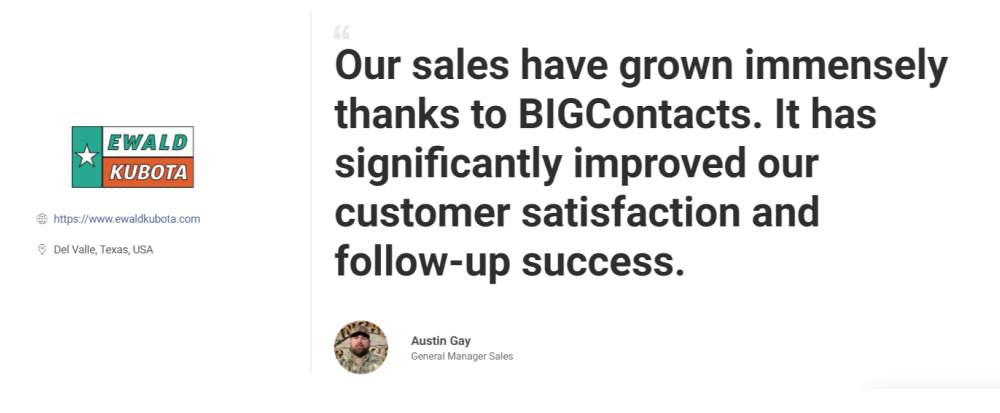
2. Insightly – Best for Integrated Marketing & Customer Service
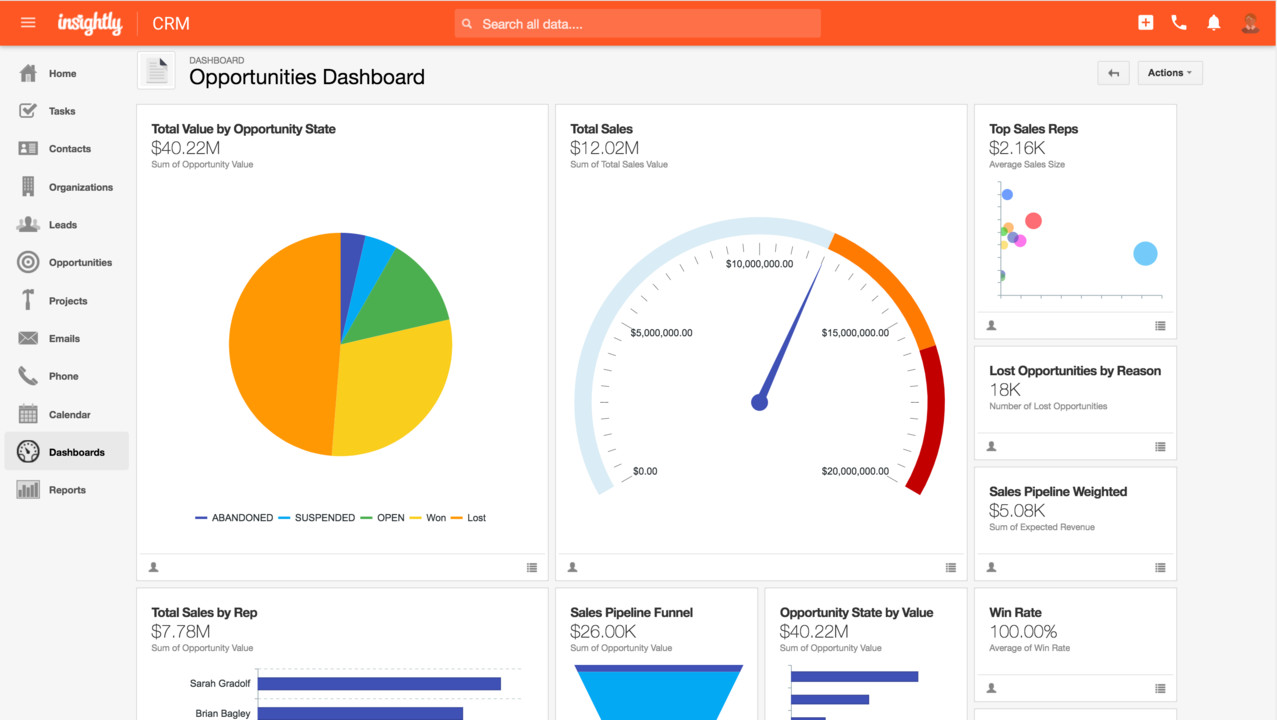
Image Source: LinkedIn
I’ve had the chance to use Insightly for streamlining both my marketing efforts and customer service operations. As a startup, managing both seamlessly was crucial, and Insightly really delivered. I loved how it combined CRM with project management, helping me to track customer interactions and the status of ongoing tasks.
The marketing automation features helped me create and schedule campaigns, while its customer service tools ensured I never missed an issue. The ease of use and integrations with other tools made it perfect for my growing team.
With Insightly, I could build stronger relationships with customers while also keeping everything organized. Whether it’s handling leads, automating marketing, or responding to customer inquiries, this CRM has been a solid choice for my startup.
What You’ll Like:
- Customizable Pipeline to match your specific business process, making tracking leads and deals more efficient
- Email Tracking and Automation to set up automated email sequences and track their performance
- Task and Project Management to manage tasks and projects within the CRM, ensuring smooth coordination between teams
- Integrations with popular tools like G Suite, Microsoft 365, and MailChimp to keep everything in sync
What You May Not Like:
- The reporting features may feel restrictive for users who need more advanced or deeply customizable reports
- The free plan offers limited storage, which can quickly become a limitation as your startup grows
Pricing:
- Starts at $29/user/month.
3. Keap – Best for Sales & Marketing Automation
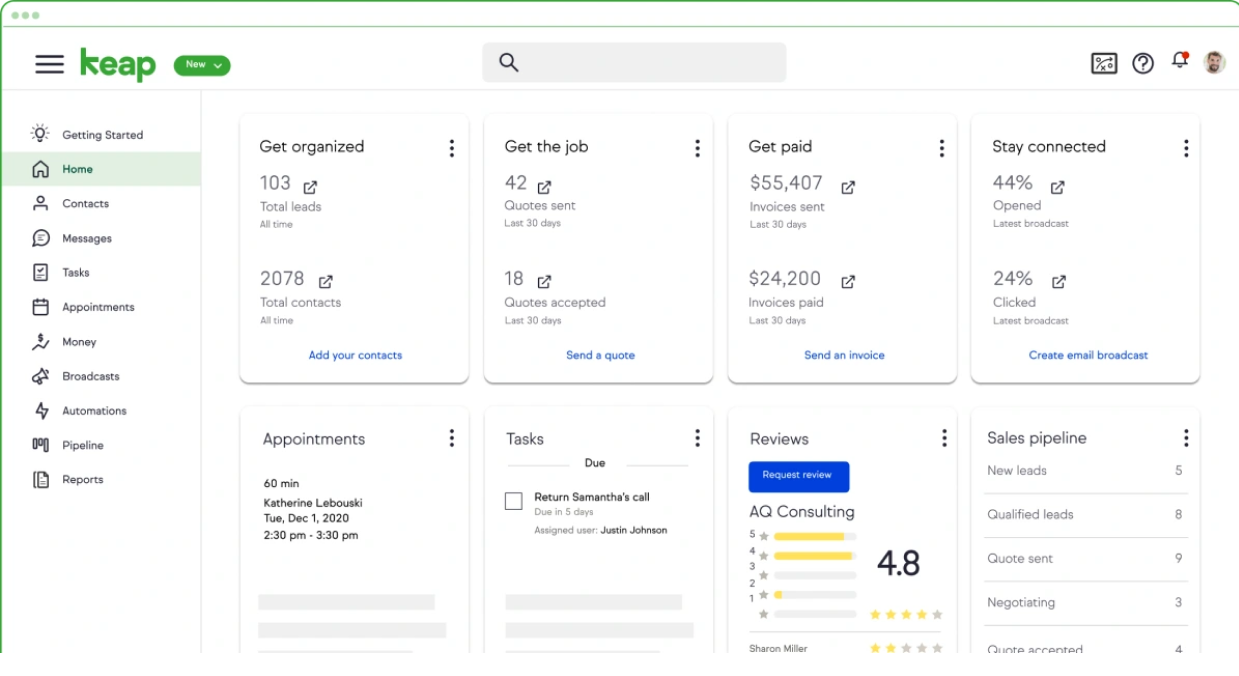
Image Source: Keap
After using Keap for a while, I found it to be an invaluable tool for managing both sales and marketing tasks in one place. As a startup, juggling sales leads, managing customer follow-ups, and running marketing campaigns simultaneously can get overwhelming, but Keap simplified everything.
I was able to automate email sequences, set up follow-up reminders, and track the performance of my marketing campaigns effortlessly. Keap’s intuitive dashboard made it easy to view and manage my sales pipeline, while the automation features helped me to create personalized workflows, saving me time and reducing manual effort.
One of the features I loved most about Keap is its ability to automate not only email campaigns but also text message marketing and lead capture forms. These tools nurtured leads efficiently, moving them down the sales funnel without missing a beat.
What You’ll Like:
- Marketing automation tools to make it easy to nurture leads and send targeted email campaigns
- Customizable forms and landing pages to help capture leads and grow your customer base
- Built-in invoicing and payment integration to streamline transactions, reducing manual work
- Pre-built marketing automation templates to save time and helped launch campaigns faster
What You May Not Like:
- Reporting lacked advanced customization which made deep data analysis difficult.
- Some integrations required third-party connectors, adding extra costs and setup time.
Pricing:
- Starts at $299/user/month.
4. Bitrix24 – Best for Team Collaboration
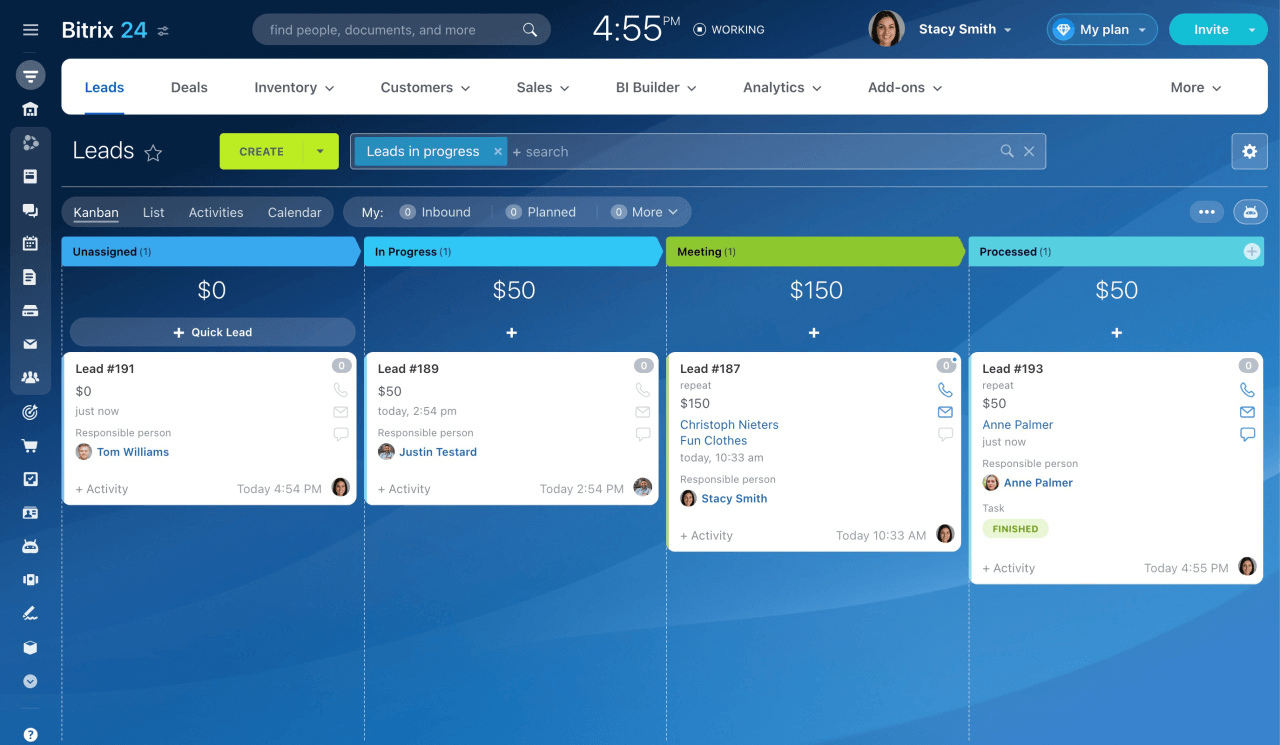
Image Source: Bitrix24 Helpdesk
After using Bitrix24, I can confidently say it’s one of the best tools for team collaboration. As a startup, managing projects, communicating with my team, and tracking leads all in one place was a huge benefit.
The tool combines CRM functionality with project management, chat, video calls, and task management, which made it easier to stay on top of everything. The customizable workflows and automation features allowed me to streamline tasks, saving me valuable time.
Bitrix24 is one of the best CRM tools for startups because it offers a comprehensive suite of tools that help small businesses grow without needing multiple platforms. The integration of CRM with team collaboration features such as shared calendars, task tracking, and communication tools made it easy for my team to stay connected and on track.
What You’ll Like:
- Powerful online store-builder with extensive customization features
- User-friendly mobile and SEO-friendly templates for developing websites
- Extensive no-code robotic process automation (RPA) for automated workflows
- Easy team collaboration with chat, video calls, and shared calendars
What You May Not Like:
- Some users report longer than expected response times from Bitrix24’s customer support
- The platform may experience slowdowns when multiple users are working simultaneously
Pricing:
- Starts at $22.9/user/month.
5. Streak – Best for Gmail Users
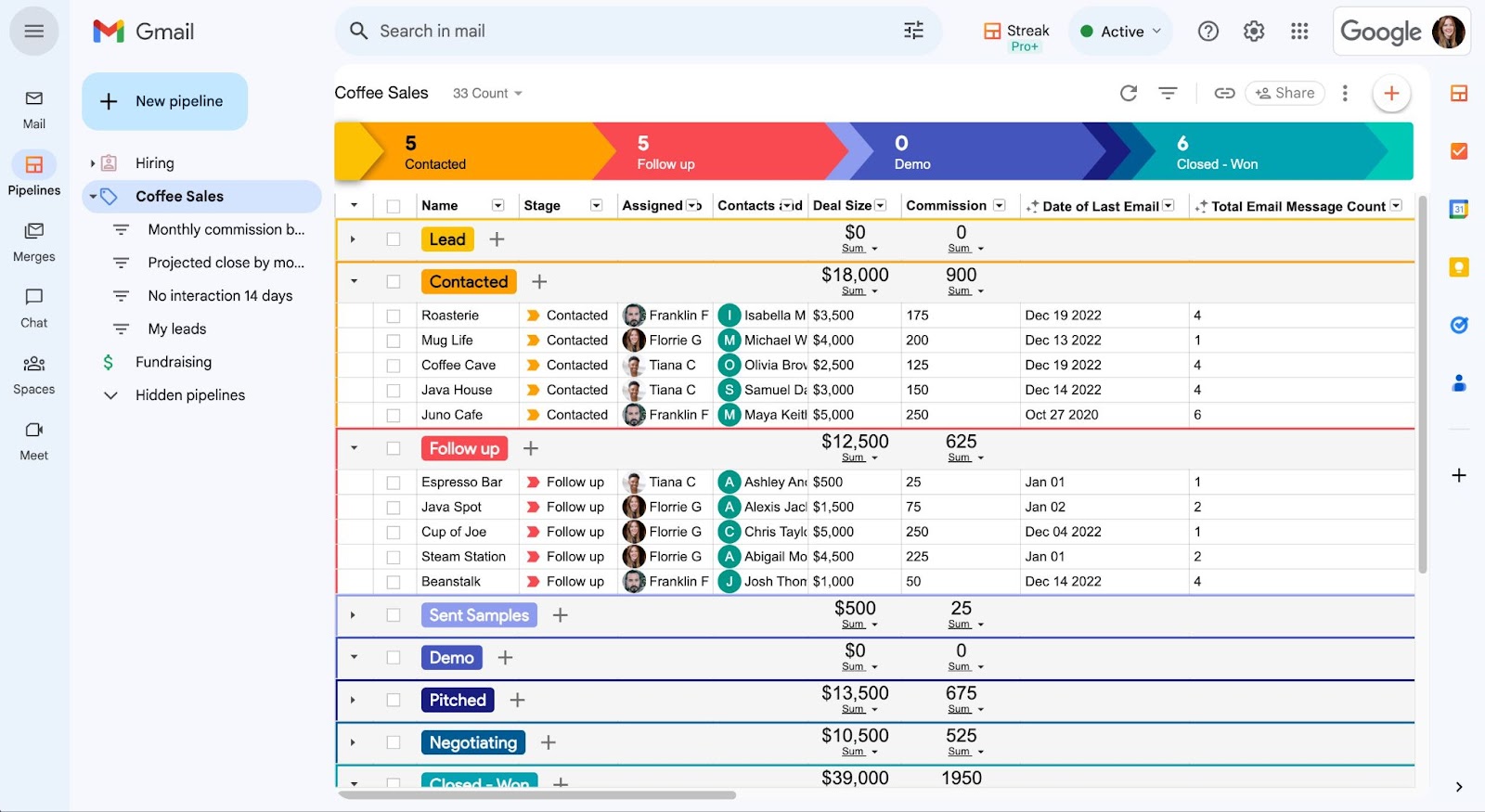
Image Source: Streak
I’ve been using Streak for my startup, and I must say it’s an absolute game-changer for anyone who relies heavily on Gmail. The integration is seamless—it feels like an extension of my inbox rather than a separate tool.
I can manage my sales pipeline, track customer service requests, and even oversee hiring processes without leaving Gmail. The best part is how customizable it is. I created multiple pipelines tailored to different needs, whether it was tracking leads, managing support tickets, or overseeing internal tasks.
For startups, time is always limited, and Streak really helps streamline operations by putting everything I need in one place. I could automate follow-ups, set reminders for important tasks, and even track when my emails were opened. It’s especially handy for anyone already using Gmail because everything is integrated smoothly.
What You’ll Like:
- Offers “Send Later” feature to perfectly time your communications with clients
- Use of ‘Snippets’ for pre-saved email templates for quick responses
- Provides a powerful AI co-pilot for your CRM activities
- “Thread Splitter” feature to separate different conversation threads efficiently
What You May Not Like:
- Streak is heavily reliant on Gmail, which can be a limitation if your business uses multiple email platforms
- Several users have reported sync issues between Streak and Gmail, particularly regarding email tracking
Pricing:
- Starts at $59/user/month.
6. HubSpot – Best for Centralizing Sales, Marketing, & Support Operations
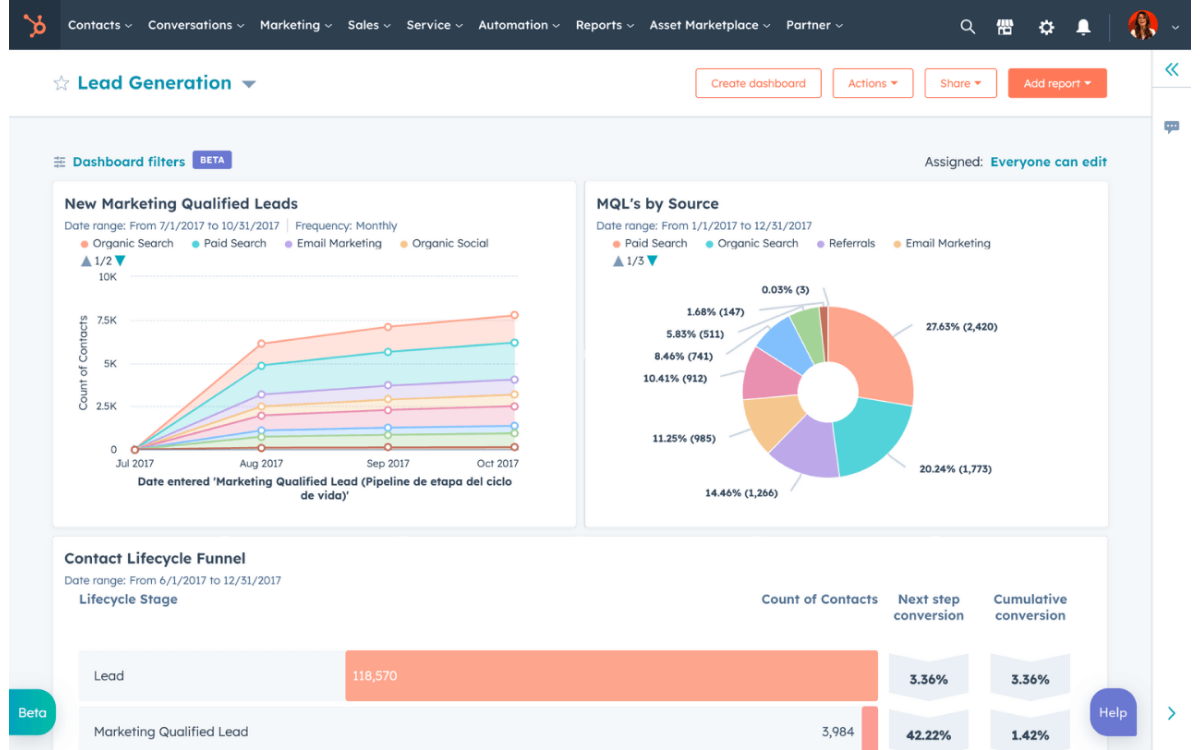
Image Source: HubSpot
I decided to try HubSpot for managing my startup’s sales and marketing, and it quickly became an essential tool for the business. The CRM helped me track leads, automate my marketing workflows, and manage customer support tickets from a single platform.
HubSpot’s seamless integration between sales, marketing, and support made it easy for my team to collaborate effectively. As a startup, the free plan offered more than enough functionality to manage contacts, automate follow-ups, and analyze performance.
I found HubSpot CRM to be one of the best tools for startups because it offers a great set of features even in the free plan and scales as your business grows.
What You’ll Like:
- Drag-and-drop email builder to create engaging, professional campaigns without coding
- Built-in SEO and content tools to help optimize marketing efforts, driving more organic traffic
- AI-powered chatbots to handle customer queries instantly, reducing response time and improving engagement
- Automated lead scoring to help prioritize high-intent prospects, improving conversion rates
What You May Not Like:
- Reporting customization options were limited, making it harder to create in-depth performance insights
- Exporting or migrating your data can be complex and time-consuming
Pricing:
- Starts at $15/user/month.
7. SugarCRM – Best for Marketing Automation
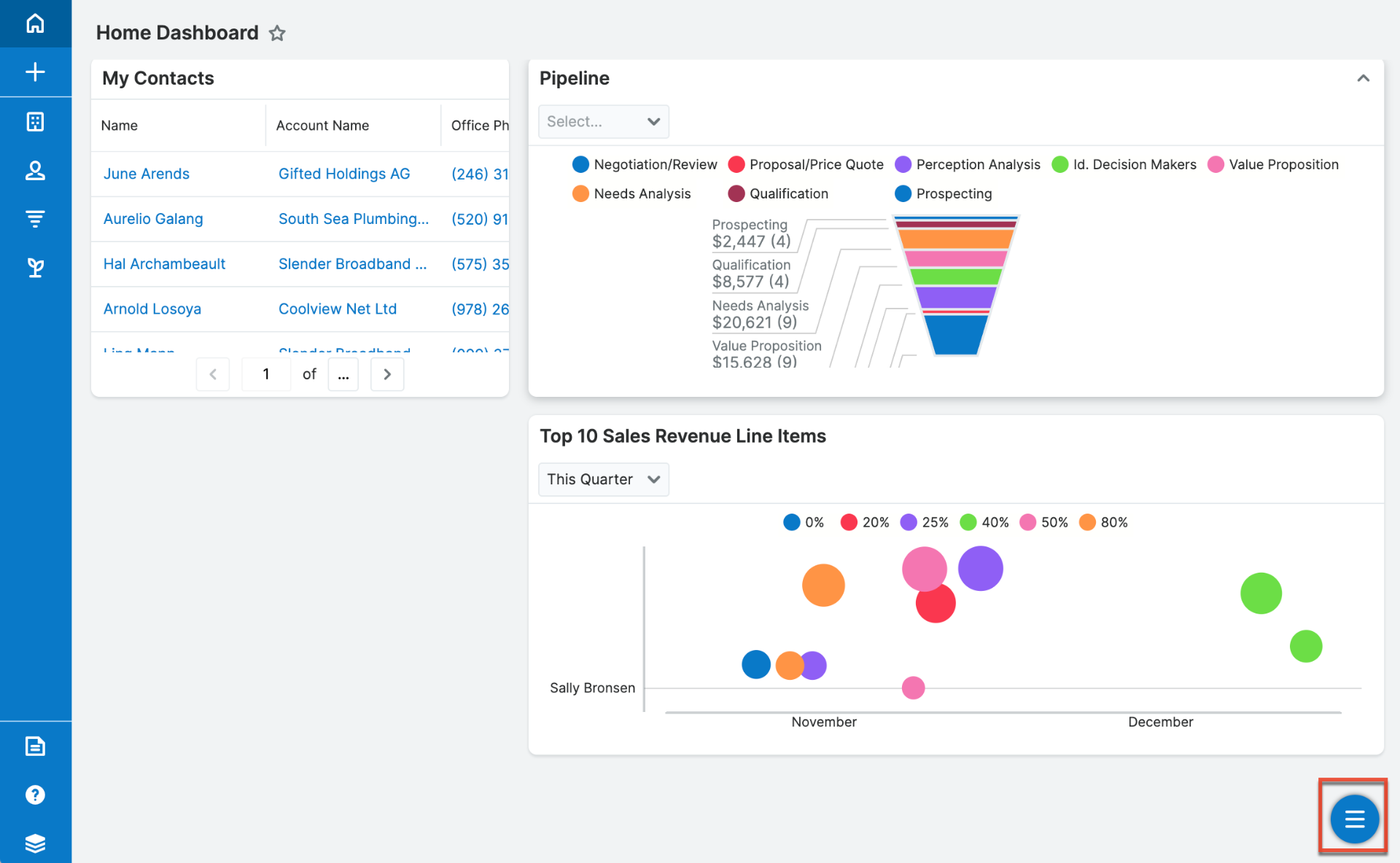
Image Source: Sugar CRM
I’ve been using SugarCRM for automating marketing tasks, and it has truly transformed how we handle customer engagement. As a startup, I needed a tool that could help streamline our marketing efforts without overwhelming our small team.
SugarCRM helped us set up automated email campaigns, track leads, and manage customer journeys all within one platform. The best part is that it integrates deeply with our CRM, so we could not only track where customers were in the sales funnel but also personalize their experience based on interactions.
What I really loved was its marketing automation tools—setting up triggered workflows based on customer behavior was quite helpful. SugarCRM also offers powerful reporting and analytics features that helped me gauge the success of campaigns and adjust strategies accordingly.
What You’ll Like:
- Advanced email marketing automation to easily set up and track automated campaigns to nurture leads
- Unified customer view to track and manage every interaction, from first contact to conversion, to deliver personalized service
- AI-powered insights to get predictive recommendations and understand trends for better decision-making
- Lead Scoring to automate lead qualification by assigning scores based on customer interactions, helping you prioritize high-value leads
What You May Not Like:
- Some users report performance slowdowns when handling large volumes of data or complex workflows
- Customizing workflows and automating tasks can be tricky for non-technical users
Pricing:
- Starts at $19/user/month.
8. Pipedrive – Best for Sales-focused teams

Image Source: Pipedrive
I decided to try Pipedrive for managing my startup’s sales process, and it quickly became a key tool for my team. One of the things that stood out to me was how simple and visual the entire sales pipeline was. I could easily see where each deal was in the pipeline, which helped me stay organized and never miss a follow-up.
As a startup, managing sales without over-complicating things is critical, and Pipedrive helped us do that. The ability to automate tasks like follow-ups and reminders meant that I could focus more on closing deals and less on administrative work. Plus, the real-time insights and reports gave us the data we needed to make smarter decisions about where to focus our efforts.
Pipedrive is one of the best CRM tools for startups because it not only simplifies the sales process but also scales as you grow. The platform can grow with you whether you’re just starting or looking to expand your team.
What You’ll Like:
- Limited email templates and tracking to offer more advanced email marketing features
- Drag-and-Drop pipeline to easily move deals through different stages of your sales pipeline
- Customizable fields to fit your specific sales process, ensuring you capture all relevant details for better decision-making
- Email integration to streamline communication, track customer interactions, and ensure no follow-up is missed
What You May Not Like:
- The email tracking and template options can feel limited
- Mobile app functionality can be limited compared to the desktop version
Pricing:
- Starts at $14/user/month.
9. Monday – Best for Visual Task Tracking
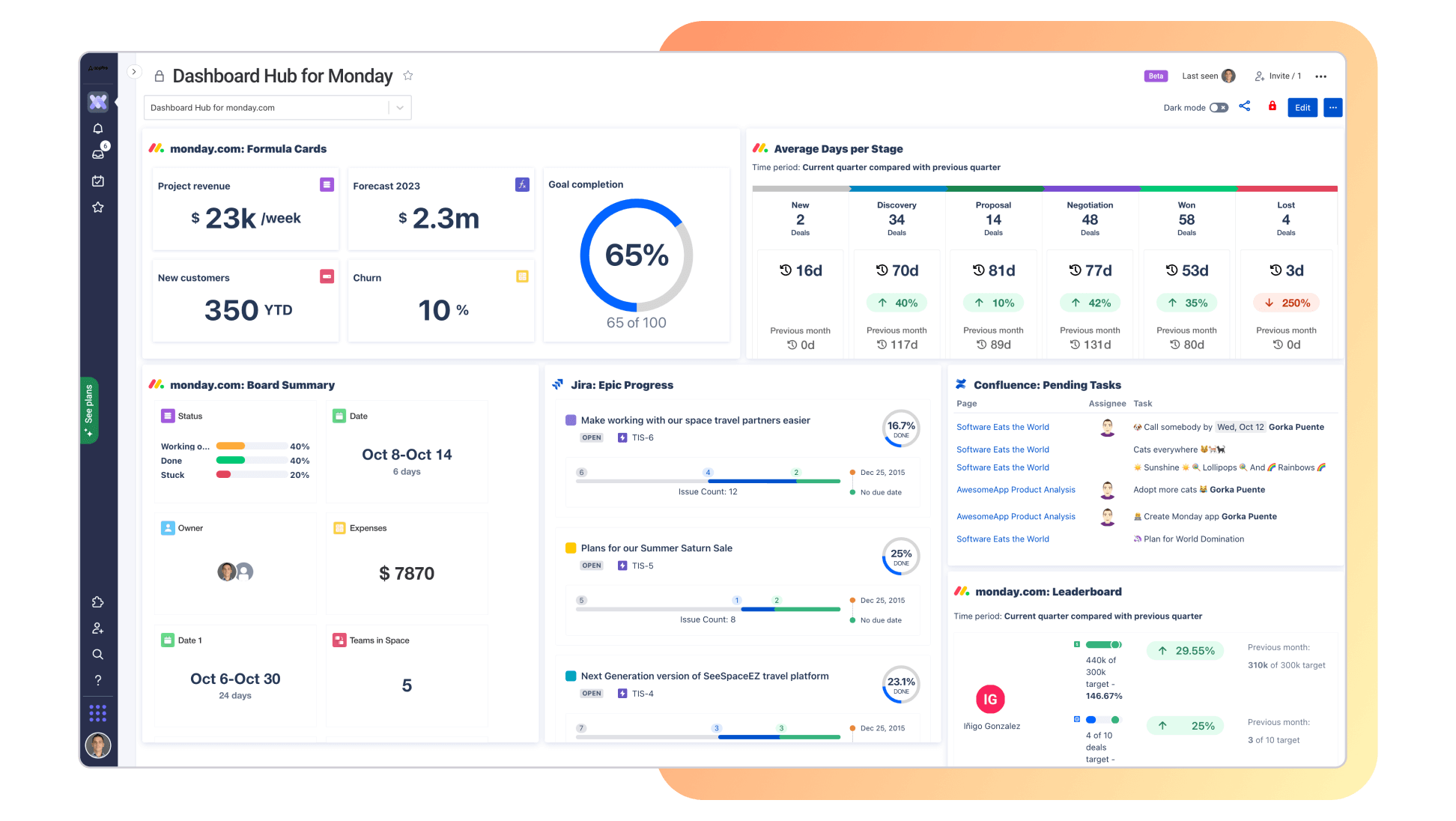
Image Source: Appfire
When I needed a platform that could adapt as quickly as our startup did, Monday.com was the answer. I found their visual boards were more than just task lists; they became dynamic hubs where we could track every project detail.
We utilized the status tracking to visually monitor progress, and the ability to add custom columns for unique data points was incredibly useful. The automation features saved us countless hours by handling repetitive tasks like status updates and notifications. I loved how easy it was to create visually appealing dashboards that consolidated key project metrics.
I found the lead management tools to be very efficient, as they helped us to capture and organize leads with precision. The capability to automate follow-up emails and track customer interactions improved our customer relationship management significantly.
What You’ll Like:
- Built-in time tracking tools to monitor how long tasks take, helping you optimize workflows
- Custom views to switch between different views (e.g., Kanban, Gantt chart, calendar) to track tasks in a way that best suits your team
- Task dependencies to ensure the right order of actions, preventing bottlenecks
- Visual dashboards to get a comprehensive overview of your team’s progress through easy-to-read visual dashboards and charts
What You May Not Like:
- With so many updates and task reminders, the notification system can become overwhelming, especially for large teams
- The formulas could be improved to offer better sorting and filtering of data across different views
Pricing:
- Starts at $12/user/month.
10. Salesforce – Best for Large & Complex Sales Organizations
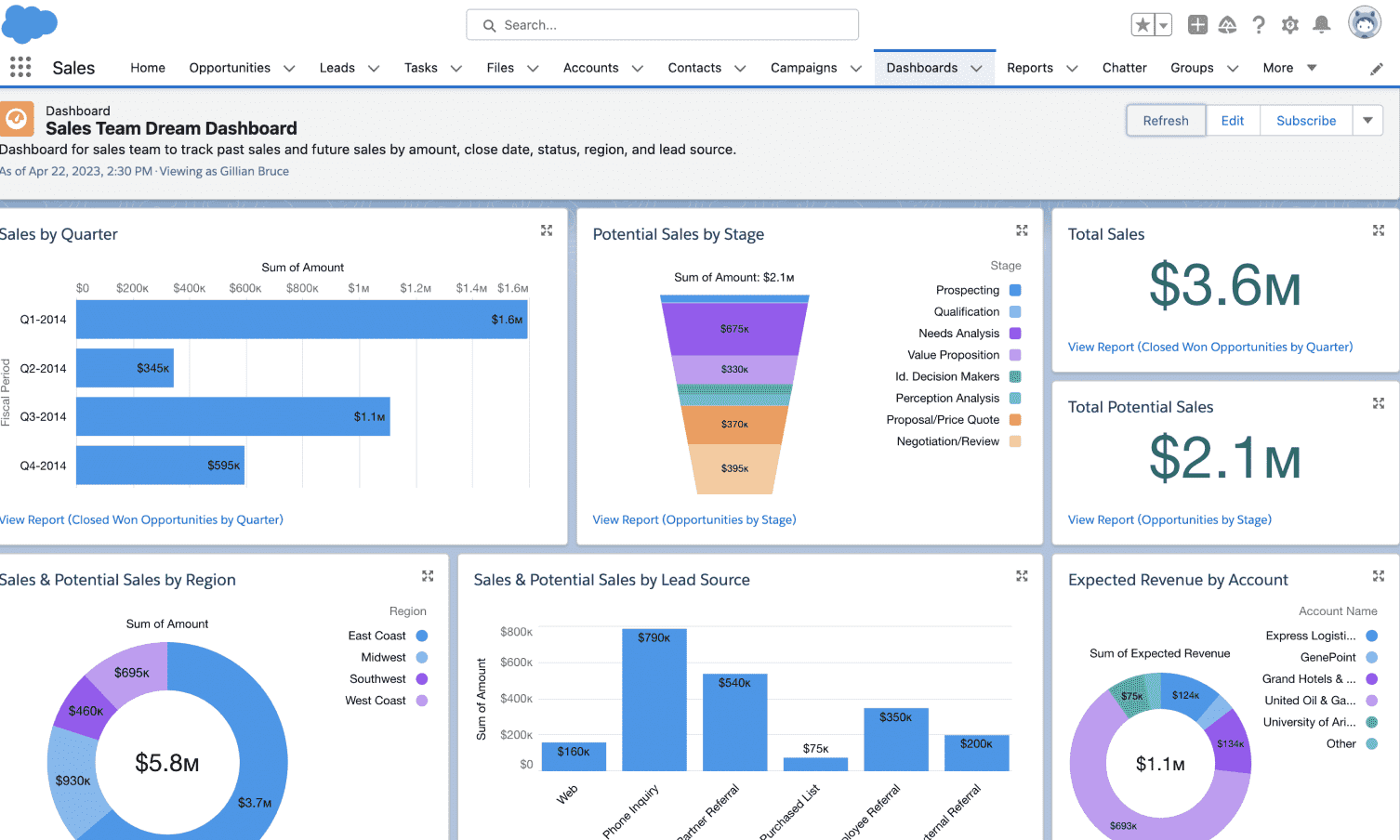
Image Source: Salesforce
I decided to implement Salesforce to manage my startup’s sales operations, and it was quite helpful for us. From the start, I was impressed with how customizable the platform is. I was able to design custom workflows, create tailored reports, and set up custom fields.
With features like task automation, follow-up reminders, and lead assignments, our team could focus more on selling rather than administrative work. The ability to integrate Salesforce with other tools like Gmail, Outlook, and even marketing platforms meant that we could maintain a unified view of our customer interactions across different channels.
Salesforce’s ability to adapt to our evolving needs and its extensive features made it one of the best CRM tools for startups. Whether you need advanced analytics, powerful automation, or flexible workflows, Salesforce offers all of these, making it the ideal tool for growing organizations.
What You’ll Like:
- Custom dashboards to tailor your dashboards to display the most important metrics, offering a quick view of key performance indicators (KPIs)
- Omnichannel support to manage customer interactions across multiple channels, including email, phone, chat, and social media, all in one place
- Salesforce Chatter enables team collaboration, allowing users to share updates, ask questions, and comment on sales opportunities in real-time
- Einstein AI provides predictive analytics to help you anticipate customer needs and make smarter decisions
What You May Not Like:
- Steep learning curve may require significant time for new users to become proficient
- Complex integration processes may require specialized technical expertise
Pricing:
- Starts at $25/user/month.
11. Zoho – Best for Omnichannel Engagement
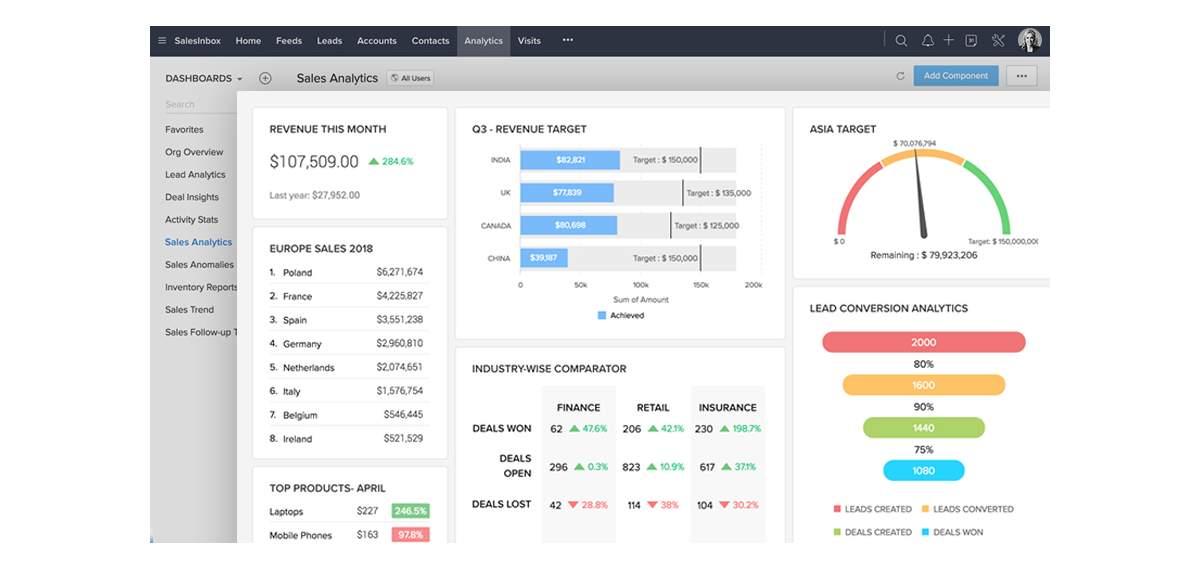
Image Source: Zoho
When I needed to connect with customers across all platforms, Zoho CRM became my go-to. I really appreciated how it centralized all our customer interactions—emails, social media, live chat, and phone calls—into one place.
I used their automation tools to send personalized emails and follow-ups, which really improved our engagement rates. I loved how I could set up workflows to automatically assign leads based on their interactions. The real-time notifications kept me informed about new messages and mentions, so I never missed an opportunity to connect.
I leveraged the multi-channel capabilities to build strong customer relationships from the start. I found the ability to integrate with social media platforms incredibly useful for reaching potential customers. The lead scoring feature helped us prioritize our efforts, focusing on the most promising leads.
What You’ll Like:
- Omnichannel communication integration for seamless customer engagement
- Customizable fields to create fields that fit your business processes, making it easier to manage data in a way that suits your needs
- Reports & analytics to track performance, providing actionable insights to improve your sales strategies
- Customizable dashboards to track important metrics and performance
What You May Not Like:
- While Zoho CRM integrates with email, there can be occasional syncing issues with certain email providers, causing delays
- Some users report that the support team’s response time can be slow, especially during peak hours
Pricing:
- Starts at $14.8/user/month.
What Are the Essential Features of CRM for Startups?
Alright, let’s break down what your startup really needs in a CRM. You’re busy, so you need tools that actually make your life easier, right? Here’s a rundown of essential features:
1. Contact Management
Think of this as the heart of your CRM. You need to store all your customer info – names, emails, phone numbers, social media profiles – in one place. But it’s not just about storage. Look for features that let you easily segment contacts based on demographics, interests, or purchase history.
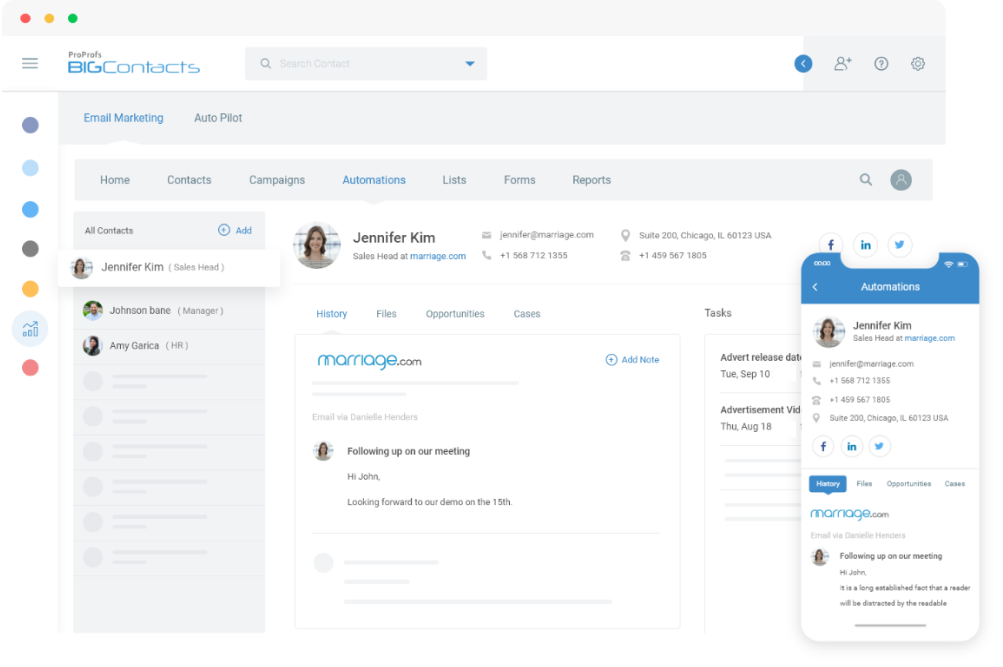
2. Sales Pipeline Management
Picture a visual representation of your sales process. You need to see where each lead is in the pipeline, from initial contact to closed deals. This feature helps you identify bottlenecks and prioritize your efforts. Drag-and-drop functionality is a huge plus!
Want to learn more about optimizing your sales pipeline? Check out this quick video:
3. Email Integration
Jumping between your email and CRM is a time-waster. Look for a CRM that integrates seamlessly with your email provider. Features like email templates, automated follow-ups, and email marketing and tracking can save you tons of time.
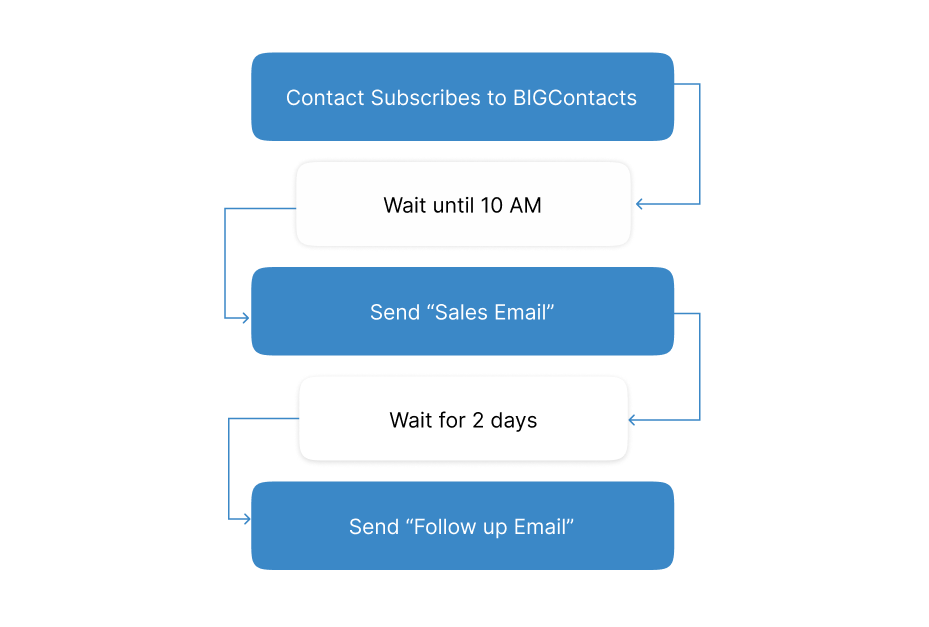
4. Task and Activity Management
You’ve got a million things to do. A good CRM helps you stay on top of your tasks and activities.
You should be able to schedule calls, set reminders, and track your progress. Collaboration features are also essential for team alignment.
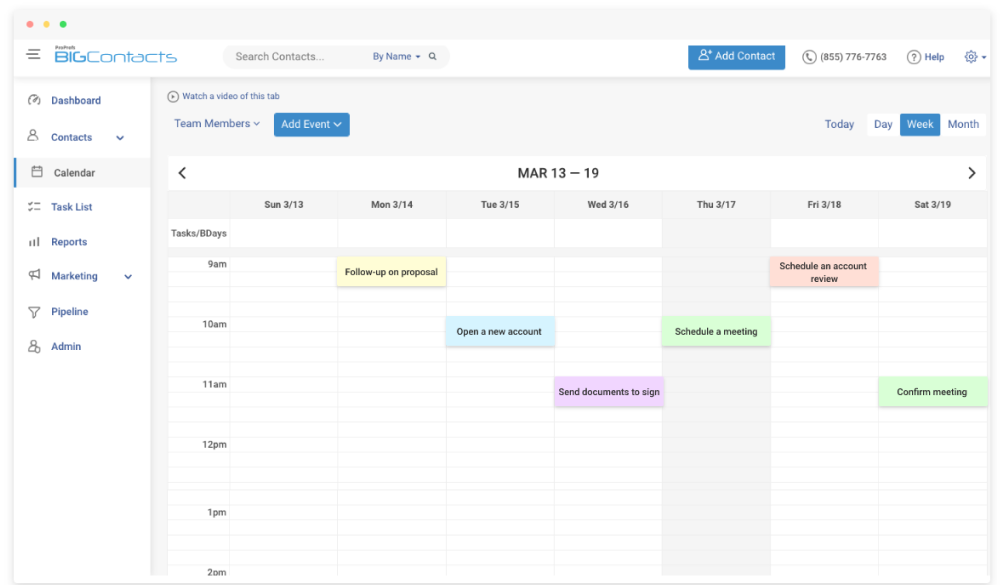
5. Lead Scoring
Not all leads are created equal. Lead scoring allows you to assign points to leads based on their behavior and demographics. With lead scoring, your CRM can automatically prioritize high-potential leads, ensuring you spend time on the most promising opportunities.
6. Mobile Accessibility
You’re probably not always at your desk. A CRM with a mobile app lets you access your data and stay connected on the go. This is especially important for sales teams that are often out in the field.
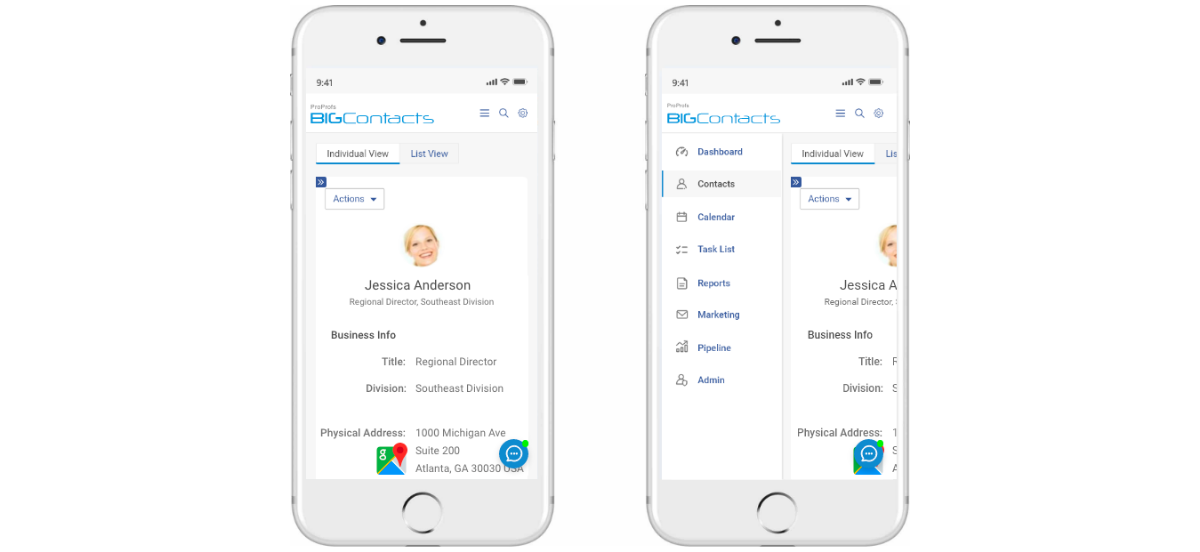
7. Integration with Other Tools
Your CRM shouldn’t be an island. It needs to integrate with other tools you use, like your marketing automation platform, accounting software, and social media channels. This creates a seamless workflow and prevents data silos.
8. Reporting and Analytics
Data is your friend. You need a CRM that provides insightful reports on your sales, marketing, and customer service performance. Look for customizable dashboards that give you a quick overview of key metrics. When looking for the Best CRM system for Startups, make sure that the reporting and analytics are easy to understand and implement.
What Can Startups Do With a CRM?
As a startup, you’re juggling multiple tasks—from handling customer relationships to managing leads. A CRM (Customer Relationship Management) system can make this easier and more efficient. So, what can you actually do with a CRM? Let’s break it down:
1. Organize Customer Information
With a CRM, you can keep all your customer data in one place. Track contact details, communication history, and even preferences—no more hunting through emails or scattered spreadsheets!
2. Manage Your Sales Pipeline
A CRM lets you track where each lead is in your sales process. You can easily monitor the stages of deals and follow up at the right time, increasing your chances of closing more sales.
3. Automate Routine Tasks
Imagine how much time you’ll save by automating repetitive tasks like email follow-ups, reminders, and scheduling. With the best CRM for SaaS startup, you can streamline your workflow and focus on growing your business.
4. Provide Better Customer Support
A CRM helps you track customer issues and requests. This way, your support team can quickly respond to inquiries and resolve issues, leading to happier customers and stronger relationships.
5. Personalize Communication
By having all customer interactions in one place, you can easily personalize your messages. Whether it’s a follow-up email or a marketing campaign, CRM helps you communicate more effectively.
6. Track Marketing Campaigns
Want to know how well your marketing efforts are performing? A CRM lets you track campaigns, measure engagement, and see what’s working—so you can adjust strategies for better results.
7. Enhance Team Collaboration
CRMs allow your team to stay in sync. Share important customer data, collaborate on deals, and ensure everyone is on the same page, all within the system.
8. Make Data-Driven Decisions
With all your customer data in one place, you can use CRM analytics to understand customer behavior, sales trends, and performance metrics, which helps you make smarter business decisions.
What Are the Types of CRM for Startups?
Choosing the right CRM for your startup can be a bit overwhelming. There are so many different options available, each with its own unique set of features and benefits. Let’s explore the main types of CRM and see how they can benefit you!
1. Operational CRM
Operational CRMs are designed to automate and streamline your sales, marketing, and customer service processes. They typically include features such as contact management, lead scoring, sales pipeline tracking, and email marketing.
2. Analytical CRM
Analytical CRMs focus on collecting and analyzing customer data to gain insights into customer behavior, preferences, and needs. This information can be used to develop targeted marketing campaigns, improve customer service, and increase sales.
3. Collaborative CRM
Collaborative CRMs are designed to improve communication and collaboration between different departments within your company. They can help you break down silos and ensure that everyone is on the same page when it comes to customer interactions.
4. Strategic CRM
Strategic CRMs help you align your business strategy with the needs and preferences of your customers. They can be used to develop long-term customer relationships and create a loyal customer base.
5. Campaign Management CRM
This one is focused on your marketing efforts. It lets you create, execute, and track marketing campaigns across various channels. You can see what’s working and what’s not, and optimize your campaigns for better results. This type is very helpful for startups that are heavily focused on digital marketing.
6. Free CRM
For startups on a tight budget, this is a lifesaver. You get basic features, like contact management, without the hefty price tag. For those just starting out, finding the Best Free CRM for Startup is a great way to start.
Choosing Your CRM:
- Consider your needs: What problems are you trying to solve?
- Think long-term: Can the CRM grow with your business?
- Test it out: Most CRMs offer free trials, so take advantage of them!
Boost Your Startup’s Success with the Right CRM Tool
Selecting the right CRM for your startup can make all the difference in streamlining your operations and improving customer relationships. The 6 tools we’ve discussed provide a variety of features, from advanced automation to simple contact management, each tailored to different business needs.
Whether you’re looking for something basic or a more robust platform, there’s a CRM for every stage of growth. If you’re just starting out and need a user-friendly, cost-effective solution, BIGContacts CRM could be a great choice. It offers a forever-free plan, making it ideal for startups that need to manage contacts and sales without breaking the bank.
As your business grows, you can easily upgrade to more advanced features. By investing in the right CRM, you’ll save time, reduce manual work, and be better positioned to scale your startup successfully.
Do you want to make more sales?
Get repeat sales with BIGContacts, the #1 CRM for small businesses.
CRM for Startups: FAQs
How can a CRM help my startup grow?
A CRM can help your startup grow by organizing customer data, automating tasks, and streamlining communication. It keeps track of leads, sales, and customer interactions, helping you provide personalized service. By improving efficiency and fostering better customer relationships, a CRM helps boost sales, enhance customer satisfaction, and drive long-term growth.
What startup problems does a CRM platform solve?
A CRM platform helps startups by organizing customer data, streamlining communication, and automating tasks like follow-ups. It helps track sales, manage leads, and improve customer relationships all in one place. This reduces time spent on manual work, enhances efficiency, and allows startups to focus on growth and building lasting customer connections.
Want to learn more about how CRM software can boost your sales? Check out this video:
Is CRM software affordable for startups?
Yes, CRM software can be affordable for startups. Many CRM tools offer free plans or low-cost options with basic features that are perfect for small teams. For instance, BIGContacts CRM offers a forever-free plan, which is ideal for startups just starting out. As your business grows, you can always upgrade to more advanced features. CRM software is a valuable investment that helps streamline processes and improve customer relationships, saving both time and money.
What are some challenges of using a CRM for a startup?
Using a CRM for a startup can be challenging because of the learning curve and the time it takes to set up and customize the system. Additionally, some CRMs can be expensive for small businesses, and figuring out how to integrate them with other tools or platforms can also take time and effort.
Why choose BIGContacts to scale up your startup?
BIGContacts is perfect for scaling your startup because it simplifies contact management and streamlines email marketing in one platform. With easy-to-use automation tools, custom fields, and powerful reporting features, it helps you stay organized and engage with leads effectively. It’s affordable, intuitive, and designed to grow with your business.
FREE. All Features. FOREVER!
Try our Forever FREE account with all premium features!







